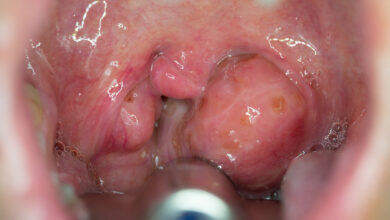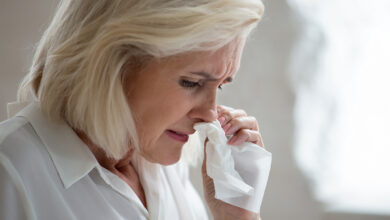RUNNY NOSE

MY NOSE RUNS ALL THE TIME!
Among the many annoying things senior citizens have is an incessantly runny nose. Mine runs. My wife’s does, too. A lot of folks have it. It always runs at inopportune times like mealtime, when you’re out in cold air, or when you’re in the midst of an important conversation. Suddenly, you realize there’s moisture on the tip of your nose that’s either just about to run down your upper lip or drip on the floor. You keep a handkerchief in your pocket or stay close to a box of a Kleenex because you know you will need them. What an inconvenience.
My late father-in-law had it so bad he always said his nose “ran like a sugar tree!” I’ve never seen a sugar tree run or drip liquid sugar or anything else, but I guess they must be prolific producers. His nose always had a drop of fluid at the tip ready to be wiped away or drip.
He, and the rest of us runny-nosers, had/have rhinitis, or more accurately, rhinorrhea. In this case, “rhin” is the derivative for nose while “rrhea ” is the root for loose or runny. Thus rhinorrhea is a loose, runny nose. Rhinitis is the cause of rhinorrhea; “rhin” is nose, of course, and “itis” is the derivative for inflammation. So inflammation of the nose causes it to run.
There are several sub-types of rhinitis, usually determined by whatever triggers the rhinorrhea.
These subtypes are:
1. Allergy-mediated or Allergic Rhinitis. This variety causes sneezing, nasal itching, and
rhinorrhea. This is Hay Fever.
2. Non-allergy-mediated, Non-Allergic Rhinitis. This has several subtypes.
A. Vasomotor Rhinitis—due to engorged nasal blood vessels
B. Infectious Rhinitis— caused by bacteria and viruses
C. Atrophic Rhinitis—caused by thinning of the nasal lining
D. Rhinitis Medicamentosa—caused by overuse of nasal sprays, nasal decongestants,
Cocaine, etc.
E. Gustatory Rhinitis—caused by ingestion of food triggers
By far, Allergic Rhinitis is the most common form. In the Spring and Fall, millions of people are troubled by it. Patients take anti-histamines, get allergy desensitization shots, and use cortisone sprays to stop the annoying symptoms.
Old folks, on the other hand, acquire a combination of problems. First, they get Vasomotor Rhinitis caused by medications they take or aging changes to the nasal lining, and also Gustatory Rhinitis set off by certain foods to which they are sensitive. So when they’re focusing on a task and get a runny nose, Vasomotor Rhinitis is at work. When they’re eating dinner, Gustatory Rhinitis serves to interrupt their enjoyment. Hot, spicy foods, garlic, salsa, curry, hot sauce, chili powder, caffeine, vinegar, spices, and citrus fruits are some of the many common offenders. Some irritant chemical substance in those foods sets off the annoying dripping.
Well, it’s good to know the name of what you have, but knowing what to do about it is far more important. Gustatory rhinitis can be helped by avoiding those foods that trigger the symptoms. That’s a good idea, but there may be dozens of trigger-foods you may be unaware of and avoiding everything limits your food choices. Since success with that option is likely to be difficult, trying one of a number of nasal sprays is your next choice. Sprays do help to dry up the nose, stop the running, and reduce nasal congestion. Ipratropium bromide (Atrovent) spray does all that and more and can be used long term. Used right before meals and at bedtime, it dries up nasal secretions and allows the patient to eat without wiping his nose. Atrovent helps Vasomotor rhinitis, too.
Rhinitis Medicamentosa is a self-induced subtype that most often is caused by overuse of over-the-counter nasal sprays. Neo-Synephrine, Afrin, and Sinex are examples. They contain chemicals that un-stop your nose, but have a “rebound effect” that begins after repeated use. When the unstopping effect recedes, the nasal lining responds (or rebounds) by swelling as bad, or worse, than before it was sprayed. This forces the patient to spray again and a vicious cycle begins. Cortisone nasal sprays like Flonase and Nasacort don’t do this. I mention this because RM is very troublesome and is best avoided by very short-term, limited use of OTC sprays.
Dr. G’s Opinion: Rhinorrhea is one of the many nuisances experienced by people of advanced age. It’s not fatal nor is it an indication of underlying disease, but it’s very bothersome. There is, however, one rare condition associated with head trauma called CSF Rhinorrhea. It begins after a head injury that damages the base of the skull above the nose. Cerebrospinal fluid (CSF) leaks from around the brain through the injured base into the nose and causes a constant runny nose. This type of rhinorrhea never lets up. It is constant and can lead to meningitis because the bony protective barrier separating the nose and the brain is interrupted allowing nasal germs to enter the brain cavity (cranium). This is potentially devastating so the leak needs to be found and sealed immediately.
I think people don’t empathize with sufferers of rhinorrhea until they have it themselves. It’s annoying. Ask your doctor to consider prescribing Atrovent as a trial to see if it’s something that might help. Another brand is Astelin. It can’t hurt to try either of them.
References: None. Personal knowledge of the author.




